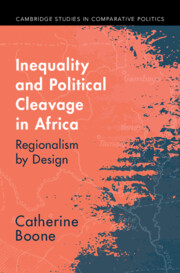Book contents
- Reviews
- Inequality and Political Cleavage in Africa
- Cambridge Studies in Comparative Politics
- Inequality and Political Cleavage in Africa
- Copyright page
- Epigraph
- Contents
- Figures
- Tables
- Preface and Acknowledgments
- 1 Economic Inequalities and Territorial Oppositions in African Politics
- 2 Region and Regionalism in African Politics
- 3 Endowment, Institutions, and Spatial Inequality
- 4 Regional Blocs and Bloc Voting in National Elections
- 5 Regional Hierarchies and Winning Coalitions
- 6 Territorial Oppositions in African Politics
- 7 Regionalism and the National Agenda
- 8 Conclusion
- Appendices
- References
- Index
- Cambridge Studies in Comparative Politics
1 - Economic Inequalities and Territorial Oppositions in African Politics
Published online by Cambridge University Press: 18 April 2024
- Reviews
- Inequality and Political Cleavage in Africa
- Cambridge Studies in Comparative Politics
- Inequality and Political Cleavage in Africa
- Copyright page
- Epigraph
- Contents
- Figures
- Tables
- Preface and Acknowledgments
- 1 Economic Inequalities and Territorial Oppositions in African Politics
- 2 Region and Regionalism in African Politics
- 3 Endowment, Institutions, and Spatial Inequality
- 4 Regional Blocs and Bloc Voting in National Elections
- 5 Regional Hierarchies and Winning Coalitions
- 6 Territorial Oppositions in African Politics
- 7 Regionalism and the National Agenda
- 8 Conclusion
- Appendices
- References
- Index
- Cambridge Studies in Comparative Politics
Summary
Does regional inequality give rise to political cleavages in African countries? If so, why and how? At what scale of politics? How do regional difference and inequality shape national politics and policy? The theory of regional politics advanced here is drawn from comparative politics theories of regional tensions that arise in the course of state-building and national economic integration. These are accentuated when socioeconomic inequality and territorial institutions align. This book argues that regional economic differentiation and spatial inequalities, in interaction with strongly territorial state institutions, shape politics and policy in African countries as they do in countries in other parts of the world. National economic integration and state-building activate subnational interests and fuel political tensions over the integration of subnational regions into the national polity and the national market. Regional economic and political heterogeneity and cross-regional inequalities shape both preferences and the relative bargaining power of subnational collectivities. These forces combine to produce persistent regional cleavage structures in national politics. Empirical support is drawn from electoral data from 44 elections across 12 countries, historical maps, and nighttime luminosity, household survey, and crop production data.
Keywords
- Type
- Chapter
- Information
- Inequality and Political Cleavage in AfricaRegionalism by Design, pp. 1 - 24Publisher: Cambridge University PressPrint publication year: 2024



